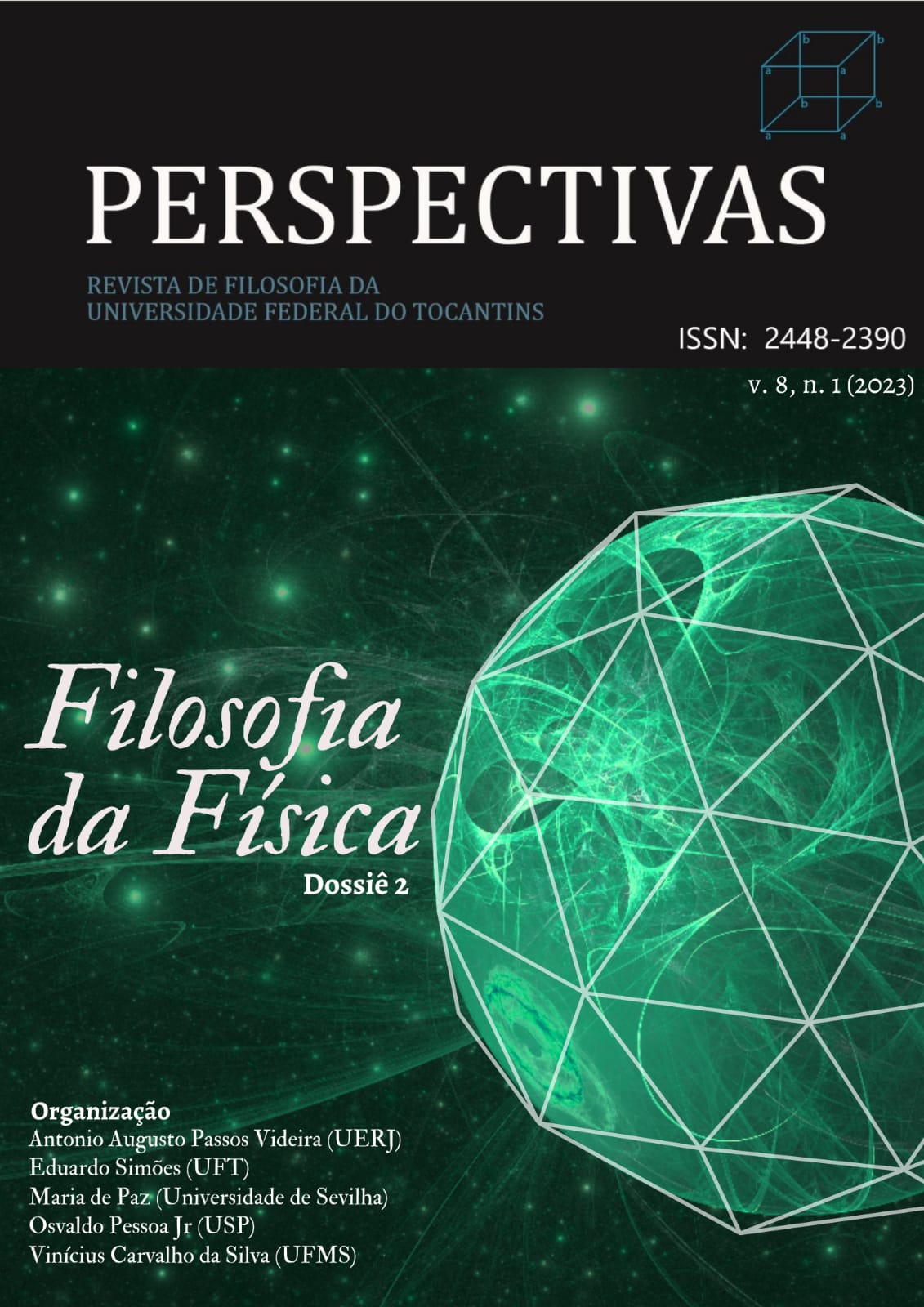“When language goes on holiday”
Reflection on the problems of language in QM through Wittgenstein's philosophy
DOI:
https://doi.org/10.20873/rpv8n1-67Resumo
The new discoveries of QM led to re-assessing, broadening the meanings of many physical concepts, and formulating a new logic that was no longer based on the classical principles of non-contradiction, identity, and causality. Heisenberg considered the classical logic and the conception of language expressed in the Tractatus Logico-Philosophicus inadequate for the understanding of the problems of language with which the physicists of the Copenhagen school had had to deal in order to define the foundations of Quantum Mechanics. On the contrary, he saw in Wittgenstein’s posthumous Philosophical Investigations the key to solving those problems. One may formulate a proportion and state that the use of language described in the Tractatus fits the use of language in Classical Mechanics, as the use of language described in PI fits the use of language in QM.
I interpret the reflections of the physicists of the Copenhagen school on the limits of language relative to QM by highlighting how the epistemological revolution of quantum physics shares a conception of language similar to that expressed by late Wittgenstein in PI. I also aim to explain why Heisenberg considered it inappropriate to subsume the propositions and concepts of QM under the rules of the propositional logic of Tractatus. I explain why the philosophy of language expounded in PI, which is based on language games and resemblance families, sheds a light on how and why QM has contributed to renewing existing concepts (such as space, trajectory, observer, etc.) and to formulate a new logic (quantum logic).
Referências
BARROW-GREEN, J. Poincare and the Three Body Problem. American Mathematical Society, 1996
BIRKHOFF, G., VON NEUMANN, J. The Logic of QM. Annals of Mathematics, 37, 4, 1936. 823-843.
BLACK, M. Models and Metaphors. Ithaca, NY: Cornell University Press, 1962.
BOYD, R. Metaphor and Theory Change: What is "Metaphor" a Metaphor for?. In ORTONY, A (ed.) Metaphor
and Thought. Cambridge: Cambridge University Press, 1979. 356-408.
BOHR, N. Atomic Physics and Human Knowledge. New York: Wiley and Sons, 1958.
BOHR, N. Collected Works. Amsterdam: Elsevier, 1972–2008. Vol. 6.
DALE, J. Quantum Indeterminacy and Wittgenstein’s Private Language Argument. Philosophical Explorations, 2, 2, 1999. 79-95.
EINSTEIN, A., PODOLSKY, B., and ROSEN, N. Can Quantum Mechanical Description of Physical Reality be Considered Complet? Physical Review, 47, 1935. 777-780.
FAUCONNIER, G. and TURNER, M. The Way We Think: Conceptual Blending and the Mind’s Hidden Complexities. New York: Basic Books, 2002.
GHIAZZA, S. The Metaphor between Science and Literature. Florence: Le Monnier, 2005.
GRELLAND, H. Wittgenstein’s Picture Theory of Language as a Key to Modern Physics. In NEMETH, E., HEINRICH, R., and PICHLER, W. Papers of the 33rd International Wittgenstein Symposium 8-14 August 2010.
HEISENBERG, W. Physics and Beyond. New York: Harper & Row, 1971.
HEISENBERG, W. Physics and Philosophy: The Revolution in Modern Science. Northampton: Harper and Brothers, 1958.
HESSE, M. Models and Analogies in Science. Notre Dame: University of Notre Dame Press, 1966.
HUGHES, R. I. G. Quantum logic. Scientific American, 1981. 202-213, October.
LUGG, A. Wittgenstein and Scientific Representation. Wittgenstein – Studien, 10, 1, 2019. 211-226.
PEAT. D. Interview with Werner Heisenberg. Accessed on 10 April 2022. www.fdavidpeat.com/interviews/heisenberg.htm.
POST, E. L. Introduction to a General Theory of Elementary Propositions. American Journal of Mathematics, 43, 3, 1921. 163-185.
ISHIKAWA, S. Wittgenstein’s Picture Theory in the Quantum Mechanical Worldview. Journal of Quantum Information Science, 10, 2020. 104-125.
RUSSELL, B. Introduction. In WITTGENSTEIN, L. Tractatus Logico-Philosophicus. side-by-side-by-side edition.
http://people.umass.edu/klement/tlp/.
ULANOWICZ, R. E. Growth and Development - Ecosystems phenomenology. New York: Springer, 1986.
WITTGENSTEIN, L. Wittgenstein’s Lectures, Cambridge, 1932-1935: From the Notes of Alice Ambrose and
Margaret Macdonald. Ed. by AMBROSE, A. New York: Prometheus Books, 2001.
WITTGENSTEIN, L. Philosophical Investigations. Oxford: Blackwell, 1986.
WITTGENSTEIN, L. Tractatus Logico-Philosophicus. side-by-side-by-side edition. 2013. http://people.umass.edu/klement/tlp/.
Downloads
Publicado
Como Citar
Edição
Seção
Licença
Copyright (c) 2023 Patrizia Piredda

Este trabalho está licenciado sob uma licença Creative Commons Attribution 4.0 International License.
Os autores que publicam com esta revista concordam com os seguintes termos:
1. Autores mantêm os direitos concedidos à revista ou o direito de primeira publicação com o trabalho licenciado à Atribuição de Licença Creative Commons Atribuição 4.0 Internacional (CC BY 4.0) que permite o compartilhamento de trabalhos com reconhecimento de autoria e publicação inical nesta revista.
2. Autores têm permissão para aceitar contratos, distribuição não exclusiva da versão do trabalho publicada nesta revista (por exemplo, publicarem em repositório institucional ou como capítulo de livro) com reconhecimento de autoria e de publicação inicial nesta revista.
3. Autores têm permissão e são estimulados a publicar e distribuir o seu trabalho on-line (por exemplo, em repositório institucional ou em sua página pessoal) com as devidas referências à revista.





















